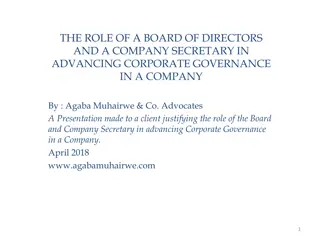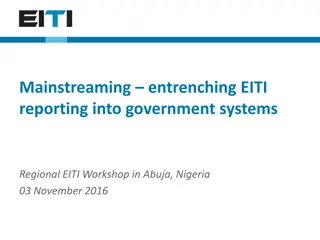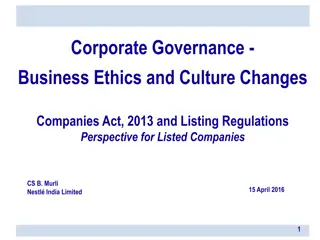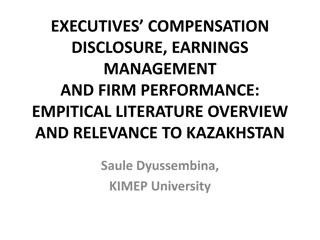Ensuring Transparency and Ethics in Corporate Governance
Explore the importance of independence and transparency in related party transactions within the framework of the Companies Act, 2013. Learn about different kinds of conflicts of interest and the significance of disclosing interests for interested directors. Delve into risk management, investor protection, and regulatory compliance for a more robust governance structure.
Download Presentation

Please find below an Image/Link to download the presentation.
The content on the website is provided AS IS for your information and personal use only. It may not be sold, licensed, or shared on other websites without obtaining consent from the author.If you encounter any issues during the download, it is possible that the publisher has removed the file from their server.
You are allowed to download the files provided on this website for personal or commercial use, subject to the condition that they are used lawfully. All files are the property of their respective owners.
The content on the website is provided AS IS for your information and personal use only. It may not be sold, licensed, or shared on other websites without obtaining consent from the author.
E N D
Presentation Transcript
REWARDING IDEAS RARING STEPS
INDEPENDENCE AND TRANSPARENCY IN RELATED PARTY TRANSACTIONS NATIONAL CONVENTION OF COMPANY SECRETARIES AT BHUBANESWAR 30 August 2018
RPTs focus perspective Companies Act, 2013 Compliances Disclosures Ease of doing Business LODR Governance Checks and balances approvals and reviews Investor Protection Ind AS Disclosures in financial statements Risk Management Investor Protection Independent Professional Scrutiny Information to Regulators
KINDS OF CONFLICT OF INTEREST ACTUAL INTEREST Being influenced by conflicting interest Regulations capture this interest Eg: Spending CSR funds on an NGO where a distant relative is housed or employed POTENTIAL INTEREST Might be influenced by conflicting interest To some extent the regulation capture this interest Eg: As a director of the bank in order to secure a benefit from the third party for his partner, granting loan to a third party PERCEIVED INTEREST Might appear to be influenced by conflicting interest when there might not be any Not captured by regulations Eg: Providing employment in a key position to an old friend s son who is highly qualified at a high pay but without adequate experience as is generally demanded by the job for other candidates. Here though the friend s son may have true abilities to perform still this may be perceived as a conflict of interest.
Interested Directors (as per S184(2)) is this sufficient? Interested director means a director who is in any way, whether directly or indirectly, concerned or interested in a contract or arrangement or proposed contract or arrangement entered into or to be entered into a) with a body corporate in which such director or such director in association with any other director, holds more than 2% shareholding of that body corporate, or is a promoter, manager, Chief Executive Officer of that body corporate; or (b) with a firm or other entity in which, such director is a partner, owner or member, as the case may be, shall disclose the nature of his concern or interest at the meeting of the Board in which the contract or arrangement is discussed and shall not participate in such meeting:
What is concerned? Why does Section 184 say concerned or interested definitely the word concerned is not synonymous of the word interested . A director who is concerned in any contract or arrangement should also disclose and distance. Certainly an Independent director may not be concerned in the contract or arrangement; but he may be concerned about the interests of the company. In such a case, he would impartially analyse the need, the terms and conditions and express his approval or dissent.
OCB and Arms Length Are they suffiicent criteria? Before availing the benefit of exemption granted by Section 188 to transactions with Related Parties which are arm s length transactions entered into in the ordinary course of business, the burden is upon the Board of Directors of the company to be satisfied that the transaction concerned meets both the above ingredients. Audit Committee / Board of Directors owes a duty to study these aspects and decide requirements as to the levels of approvals required before putting through or giving effect to a transaction or contract or arrangement which falls within any of the description of specified related party transactions. There must be a proper policy to fix repsonsibility upon the senior management to determine (a) materiality; (b) significance (could be on the basis of materiality or criticality; (c ) arm s length basis; and (d) in the ordinary course of business.
Policy Level high Points Objectives Risk / Governance Aspects Board Process Focus on right time and complete disclosures Materiality and Significant Transactions Promoter Control Role of KMPs / senior management OCB / Arm s length
PENAL ACTIONS THAT MAY RESULT FROM VIOLATIONS Voidable nature of Transaction Consequences of breach of contracts Investigation under Section 213 Action under Section 241 of Companies Act, 2013 for oppression and mismanagement Action under Section 245 of Companies Act, 2013 for class action suits Action under Section 447 of Companies Act, 2013 for fraud Enquiry into transactions under Insolvency and Bankruptcy Code, 2016 or any other law for malfeasance, or entering into undervalued or fraudulent preference transactions
RISK PROFILING FOR COMPLIANCES UNDER RPTs Arms Length Disclosures GRADIENT IV GRADIENT III Arms Length Disclosures RPT Arms Length Disclosures GRADIENT I GRADIENT II Arms Length Disclosures
RUSSIAN LAW Interested party transactions require approval only if such approval is demanded by: the general director of the company; a member of the collective executive body or the board of directors; or a shareholder holding at least 1% of the shares in the company.
Ordinary course of Business Russian law Transactions belonging to a company's ordinary course of business (which are exempted from the applicability of the requirements to interested party and material transactions) have been defined as transactions which belong to the activity of the respective company conducting analogous types of activity regardless of whether the company has executed such transactions previously provided that the transactions do not lead to the termination, amendment of the type or substantial amendment of the scale of the company's activities . and other businesses
Material Transactions under Russian law A transaction is 'material' if its subject is the acquisition or potential alienation of assets with a value of at least 25% of the balance value of the respective company's assets as of the last accounting period. The following transactions also qualify as material: loans, bank credits, pledges and suretyship agreements under which assets with a value of at least 25% of the balance value of the company's assets will be acquired or actually or potentially alienated; purchases of shares in a public joint stock company which result in the company holding more than 30%, 50% or 75% of the shares in the public joint stock company and therefore becoming obliged to purchase its other shares, provided that the price for the other shares complies with the value of at least 25% of the company's assets; and obligations to grant the temporary possession or use of assets, or a licence to use an IP right, to a third person if the balance value of the assets or IP right is at least 25% of the company's assets.
Approval requirements under Russian law Non-interested shareholders of a joint stock company's general meeting must approve a transaction if: the subject of the transaction is assets with a value equal to or exceeding 10% of the balance value of the company's assets; the subject of the transaction is 2% of the ordinary shares of the company or of privileged shares forming 2% of all of the company's shares, unless the bylaws provide for a lower number of shares; the board of directors cannot take a resolution on the consent, as the number of non-interested directors is less than the quorum for conducting a meeting of the board of directors. Otherwise, approval must be granted by the joint stock company's board of directors.
UK LAW Interested Transactions Section 175 Duty to avoid conflicts of interests Section 177 - Duty to declare interest in proposed transaction or arrangement Section 203 - Related arrangements: requirement of members approval A company may not (a) take part in an arrangement under which (i) another person enters into a transaction that, if it had been entered into by the company, would have required approval under section 197, 198, 200 or 201, and (ii) that person, in pursuance of the arrangement, obtains a benefit from the company or a body corporate associated with it, or (b) arrange for the assignment to it, or assumption by it, of any rights, obligations or liabilities under a transaction that, if it had been entered into by the company, would have required such approval, unless the arrangement in question has been approved by a resolution of the members of the company. 197 Loans to directors: requirement of members approval 198 Quasi-loans to directors: requirement of members approval 200 Loans or quasi-loans to persons connected with directors: requirement of members approval 201 Credit transactions: requirement of members approval
Contrasting UK and US Laws The UK laws focus more on the internal front than the external approvals when compared to USA, In UK law board approval emerged very quickly in the nineteenth century because the English courts accepted that the no conflict principle was a default rule, out of which the shareholders could contract via appropriate provisions in the articles. In the US board approval emerged more as a result of judicial and legislative development of fiduciary doctrine than through private ordering, though private ordering played a subordinate role in the US as well. Now that the Companies Act 2006 in the UK has endorsed board approval, the two systems seem even closer in terms of functional result.
Contrasting with UK, US and Indian Laws development of the fiduciary doctrine! The significant difference lies in the manner in which the two systems respond to the risks of inadequate scrutiny under a board approval mechanism In the general UK law, the main mechanism is prior shareholder approval of conflicted transactions. This is done for classes of transaction where the legislature has perceived the risks of inadequate board scrutiny to be substantial. In India, as well as in UK and USA, Board approval by a disinterested quorum was a default requirement In UK law for long controlling shareholders fell outside the doctrinal scope of UK law, and so the law developed, rather slowly, a number of piecemeal and incomplete mechanisms for dealing with this category of RPT. So was the position in India too. In contrast, in USA on the other hand brought controlling shareholders within the fiduciary fold.
YOU ARE THE BEST JUDGE OF YOUR INTERESTS IGNORING COMMON INTERESTS FOR SELF INTEREST IS AN OFFENCE MORALITY IS JUDGEMENT TO DISTINGUISH RIGHT FROM WRONG VISION TO SEE THE TRUTH COURAGE TO ACT UPON IT DEDICATION TO THAT WHICH IS GOOD INTEGRITY TO STAND BY THE GOOD AT ANY PRICE























